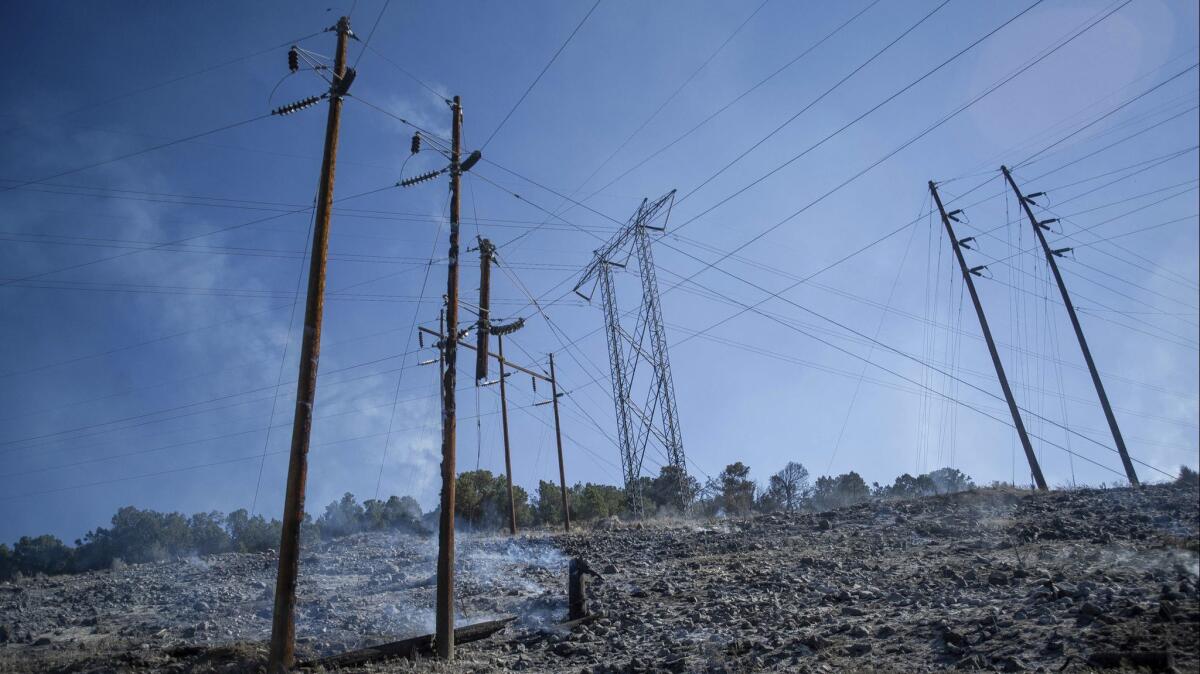Editorial: Even as California gets hotter and drier, lawmakers continue to punt on wildfire liability

- Share via
The most intense debate in the California Legislature this summer was also the wonkiest: Whether to lift the requirement that investor-owned electric utilities such as Southern California Edison reimburse property owners for losses caused when their electrical equipment sparks a fire, even if the utility did nothing wrong and could not have reasonably prevented the blaze.
But alas, the topic became too politically hot as the Aug. 31 legislative deadline got closer — and the state burned from wildfires raging in the north and south. Consumer groups howled that easing the threat of liability would discourage the big three utilities — Edison, San Diego Gas & Electric and Pacific Gas & Electric — from adopting important safety measures. Insurance companies warned they would have no choice but to hike premiums and maybe even deny coverage to property in high fire risk areas. At the same time, utilities asserted that if things didn’t change, they might go belly up after a few more years of widespread, climate-change-fueled wildfires.
Late last week legislators decided to pull the plug on the liability question, at least for 2018. Sen. Bill Dodd (D-Napa), co-chair of legislative committee grappling with the topic, said it had become a distraction from more pressing wildfire issues such as forest management and vegetation removal, and was off the table for the year.
It’s an odd statement, because it was clear from the start that the main purpose of the joint legislative conference committee called by Gov. Jerry Brown and legislative leaders in July was to wrestle with the liability issue while there was sufficient interest, not to mention a governor willing to take the heat sure to emanate from such controversial reform.
Power lines are one of the most frequent causes of wildfires in California, and with a hotter and drier future, “firenados” are projected to be a regular occurrence. Without a change to liability laws, the hellish damage wreaked by the flames could bankrupt the companies responsible for providing electricity to most Californians. Reform is crucial to make sure there’s a fair way to pay for future wildfire costs that doesn’t shift too much burden onto either the power companies or their customers.
Enter the Fray: First takes on the news of the minute from L.A. Times Opinion »
State law currently holds utilities strictly liable for the damage to homes and property done by fires linked to their equipment, even if there was no negligence involved. When insurance companies pay customers for losses to their homes or possessions, they sue the utilities for reimbursement, and utilities typically pass those costs onto consumers through their rates. Insurers also raise their premiums to reflect the claims. In this way, the cost of disasters like wildfires has been spread among both ratepayers and the residents who carry insurance.
But recently, state regulators have made it harder for utilities to pass liability costs to customers. In November, the Public Utilities Commission told SDG&E it could not raise rates to cover $380 million in claims from wildfires in 2007 after a court said the utility did not properly clear nearby vegetation. (SDG&E is appealing that decision, and the other utilities are watching the case closely because of its implications for the future.)
Wildfire liability was a perfect issue for a lame-duck session — important, technical and politically volatile. Brown had even done the hard work of coming up with a reasonable proposal to debate that was both tougher on utilities when their errors caused a fire but also more forgiving of them when they did nothing wrong. Specifically, Brown’s proposal would have given judges more discretion to “balance the public benefit” of the utility company’s services to consumers with the “harm caused to private property.” Most important, Brown’s proposal would not have allowed utilities to raise rates to pay for damages caused by their own mismanagement or negligence. Utilities would have been forced to cover those costs out of investor returns.
We’re not saying this was the perfect proposal, only that it was a good starting place for negotiations. But now it’s just the ending place. Although putting off liability reform might give legislators some breathing room now, it’s not going to get any easier next year when there’s a new governor who may have little interest in sticking his toes into such hot water in his first year.
Follow the Opinion section on Twitter @latimesopinion and Facebook
More to Read
A cure for the common opinion
Get thought-provoking perspectives with our weekly newsletter.
You may occasionally receive promotional content from the Los Angeles Times.









